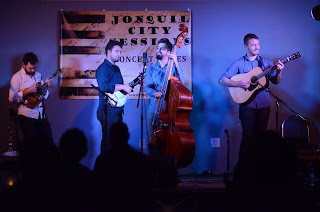Click here to enjoy the YouTube Playlist
Click here to enjoy the photo album
About the Slocan Ramblers
The Slocan Ramblers are Canada’s young bluegrass band to watch. Rooted in the tradition, fearlessly creative, and possessing a bold, dynamic sound, The Slocans (2015 Edmonton Folk Fest Emerging Artist Award recipients), have quickly become a leading light of Canada’s roots music scene, built on their reputation for energetic live shows, impeccable musicianship and their uncanny ability to convert anyone within earshot into a lifelong fan. Instrument masters individually, their combined vocals and harmonies join in a tight, rolling, foot-tapping experience you won’t be able to resist or forget!
On their new album, Coffee Creek (2015) The Slocan Ramblers blend lightning fast and devilishly intricate instrumentals with the sawdust-thick vocals of singer Frank Evans, who takes lead on songs ranging from rowdy old-time numbers like “Groundhog,” to a Dustbowl classic like Woody Guthrie’s “Pastures of Plenty.” “Toronto audiences don’t respond to a clean, polished Nashville sound,” tune composer and mandolinist Adrian Gross explains. “They dig a lot of energy in their music, a rowdy bar vibe. They’re hard to win over.” But The Slocan Ramblers have won them over, moving from a young ensemble of bluegrass pickers to one of the best known Canadian roots bands. They’ve done this by staying true to the roots of the music, not seeking to revive anything but rather to tap the rough and rowdy heart of the music.
Coffee Creek was produced by the band’s friend and mentor Chris Coole (The Foggy Hogtown Boys), a well-known banjo player and community leader in Toronto’s bluegrass and old-time scenes. Like Coole, The Slocan Ramblers bring the live, collaboratory aspects of the music to the fore, and they understand that if you polish up the music too much, you lose the raw excitement that makes it so vibrant. In the liner notes, Coole breaks it down: “What really impressed me while we were working on this album, was that, while they can pull off the precision and virtuosity that is at the backbone of bluegrass, they understand the power of the fragile moment in music. The fragile moment used to be a big part of what made an album cool–Monroe singing just beyond the edge of his voice, the moment right before you realize Vassar isn’t lost–the moment on and beyond the edge.” Listen to Evans’ worn vocals and you’ll hear some of the edge that great singers like Keith Whitley brought to the music. Or try Gross’ powerfully discordant and innovative mandolin solo on “Groundhog,” or Darryl Poulsen’s counterpoint Lester-Flatt-runs towards the end of the title track, or the rumbling beats of Alastair Whitehead’s acoustic bass on “Call Me Long Gone” (or Whitehead’s beautiful, world-weary original songs like “Elk River” or “Angeline”) to get a feel for how The Slocan Ramblers are pushing the envelope.
This is roots music without pretension, music intended to make you feel something, music to get you moving in a crowded bar. The Slocan Ramblers recorded Coffee Creek the same way they perform on stage: standing up, leaning into the music, and pushing harder and harder for that edge just beyond.
The Slocans are:
Frank Evans: Banjo
Adrian Gross: Mandolin
Darryl Poulsen: Guitar
Alastair Whitehead: Bass
On their new album, Coffee Creek (2015) The Slocan Ramblers blend lightning fast and devilishly intricate instrumentals with the sawdust-thick vocals of singer Frank Evans, who takes lead on songs ranging from rowdy old-time numbers like “Groundhog,” to a Dustbowl classic like Woody Guthrie’s “Pastures of Plenty.” “Toronto audiences don’t respond to a clean, polished Nashville sound,” tune composer and mandolinist Adrian Gross explains. “They dig a lot of energy in their music, a rowdy bar vibe. They’re hard to win over.” But The Slocan Ramblers have won them over, moving from a young ensemble of bluegrass pickers to one of the best known Canadian roots bands. They’ve done this by staying true to the roots of the music, not seeking to revive anything but rather to tap the rough and rowdy heart of the music.
Coffee Creek was produced by the band’s friend and mentor Chris Coole (The Foggy Hogtown Boys), a well-known banjo player and community leader in Toronto’s bluegrass and old-time scenes. Like Coole, The Slocan Ramblers bring the live, collaboratory aspects of the music to the fore, and they understand that if you polish up the music too much, you lose the raw excitement that makes it so vibrant. In the liner notes, Coole breaks it down: “What really impressed me while we were working on this album, was that, while they can pull off the precision and virtuosity that is at the backbone of bluegrass, they understand the power of the fragile moment in music. The fragile moment used to be a big part of what made an album cool–Monroe singing just beyond the edge of his voice, the moment right before you realize Vassar isn’t lost–the moment on and beyond the edge.” Listen to Evans’ worn vocals and you’ll hear some of the edge that great singers like Keith Whitley brought to the music. Or try Gross’ powerfully discordant and innovative mandolin solo on “Groundhog,” or Darryl Poulsen’s counterpoint Lester-Flatt-runs towards the end of the title track, or the rumbling beats of Alastair Whitehead’s acoustic bass on “Call Me Long Gone” (or Whitehead’s beautiful, world-weary original songs like “Elk River” or “Angeline”) to get a feel for how The Slocan Ramblers are pushing the envelope.
This is roots music without pretension, music intended to make you feel something, music to get you moving in a crowded bar. The Slocan Ramblers recorded Coffee Creek the same way they perform on stage: standing up, leaning into the music, and pushing harder and harder for that edge just beyond.
The Slocans are:
Frank Evans: Banjo
Adrian Gross: Mandolin
Darryl Poulsen: Guitar
Alastair Whitehead: Bass






